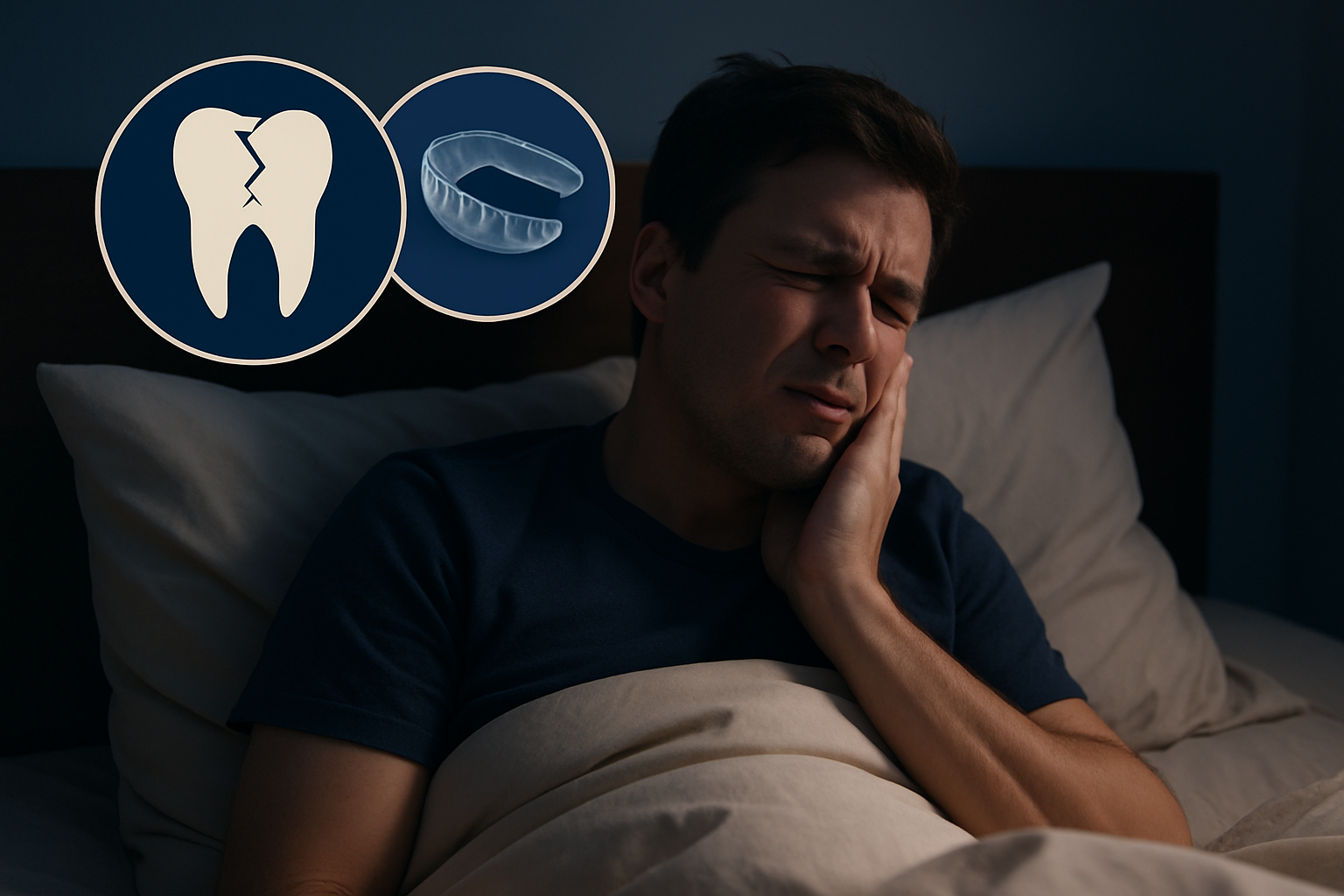Bruxism: Why Teeth Grinding Happens and How Your Dentist Can Help
If you’ve ever woken up with a sore jaw, dull headache, or chipped tooth and thought, “Did I do something in my sleep?” — chances are, you might be grinding your teeth. This under-the-radar habit, medically known as bruxism, affects millions of people, often without them even knowing it. Left unchecked, teeth grinding can wreak havoc on your mouth and lead to long-term damage.
The good news? You’re not powerless. With the right awareness, treatment, and guidance from your dentist, you can protect your smile and sleep a lot better.
TLDR – Quick Guide
- What is Bruxism? Teeth grinding or clenching, often while asleep.
- Who’s at Risk? Anyone—but especially those with stress, misaligned teeth, or sleep disorders.
- Why it’s Harmful: Can lead to cracked teeth, jaw pain, headaches, and worn enamel.
- Dental Help: Night guards, bite adjustments, stress management, and more.
- Bottom Line: Don’t ignore the signs—your dentist is your first line of defense.
Detailed Breakdown
What Exactly is Teeth Grinding?
Bruxism is the habitual grinding, clenching, or gnashing of teeth—either during the day (awake bruxism) or at night (sleep bruxism). It can range from occasional tension-related clenching to chronic, unconscious grinding that gradually wears down your teeth.
According to the American Dental Association, about 10-15% of adults experience bruxism, and it’s even more common in children, especially during growth spurts or stressful transitions like starting school.
What Causes Teeth Grinding?
There’s no single culprit. Bruxism tends to be multifactorial, influenced by:
- Stress and Anxiety: Emotional tension is one of the biggest triggers.
- Sleep Disorders: Conditions like sleep apnea often coexist with bruxism.
- Bite Misalignment: When your teeth don’t meet properly, your jaw may compensate unconsciously.
- Lifestyle Factors: Caffeine, alcohol, and certain medications (like SSRIs) are associated with higher grinding rates.
- Genetics: Sleep bruxism may run in families, suggesting a hereditary component.
The Damage It Can Do
Teeth grinding might seem harmless at first, but it can lead to serious consequences over time:
- Tooth Wear and Damage: Flattened or chipped teeth and even fractures.
- Jaw Pain and TMJ Disorders: Pain, tightness, and clicking in the temporomandibular joint.
- Gum Recession: Pressure from grinding may exacerbate gum issues.
- Headaches and Earaches: Resulting from constant muscle tension.
- Poor Sleep Quality: Disrupted rest for both the grinder and their partner.
Ignoring teeth grinding is like ignoring a leaking pipe—it gets worse the longer you wait.
How Your Dentist Can Help
Your dentist is the first person you should talk to if you suspect you’re grinding your teeth. They’ll look for telltale signs like worn enamel, jaw tenderness, or teeth misalignment. Then, they’ll develop a customized plan to protect your teeth and reduce grinding frequency.
Common treatments include:
- Custom Night Guards: These are dental appliances worn during sleep to cushion teeth and prevent contact.
- Occlusal Adjustment: Realigning bite surfaces to reduce grinding triggers.
- Botox Injections: Used in severe cases to weaken jaw muscles and reduce grinding intensity.
- Stress Management: Your dentist may refer you to stress-reduction strategies or cognitive behavioral therapy.
- Lifestyle Changes: Cutting back on stimulants like caffeine and alcohol, improving sleep hygiene, and avoiding chewing gum.
Some patients also benefit from orthodontic treatments if their bruxism stems from bite misalignment.
Key Takeaways
- Teeth grinding (bruxism) is more than an annoying habit—it’s a dental issue that requires attention.
- It’s commonly triggered by stress, misalignment, or sleep disorders.
- Symptoms include jaw pain, tooth damage, and poor sleep.
- Your dentist can help with custom solutions like night guards, bite correction, and referrals for stress therapy.
- Early intervention is key to preventing long-term damage.
FAQs
Is teeth grinding always a problem?
No, occasional grinding may not cause harm, but chronic bruxism can lead to serious dental issues and should be addressed.
How can I tell if I grind my teeth in my sleep?
Common signs include waking up with jaw pain, headaches, or noticing worn-down teeth. Your dentist can help confirm with a thorough exam.
Do children outgrow teeth grinding?
Many children who grind their teeth do outgrow it, but it should still be monitored by a dentist to prevent damage.
Are over-the-counter mouth guards effective?
While they can offer some protection, custom dental night guards are far more effective and comfortable for long-term use.
Can stress reduction alone stop bruxism?
Stress management can help significantly, especially for stress-induced grinding, but dental intervention is often still necessary.




Leave a Reply
Want to join the discussion?Feel free to contribute!